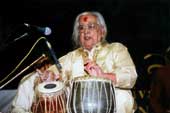 |
| The horror of rape: A scene from Lights Out |
Since the much-belated publication of Manjula Padmanabhan’s Lights Out in 2000, I have recommended it to directors who occasionally ask for titles worth staging. None of them heeded the suggestion. I don’t blame them, for it takes nerves of steel to produce such a script. But a drama that upsets the spectator’s complacence tends to go down as historic. The future will regard Lights Out in this light; English theatre in India can take pride in the fact that it gave birth to a play against sexual brutalisation the likes of which no regional theatre has attempted. I would like to see which groups become the first to translate it into Bengali or Hindi.
Premiered at Prithvi Theatre in 1986, even televised in the days when Doordarshan served the arts, it is by no means new. In fact, Jayant Kripalani, who directs it for the Seagull Foundation for the Arts, acted in the first production, directed by his wife Gulan — both of them, incidentally, with family and theatre roots in Calcutta. I don’t know whether that version influenced this revival, but Kripalani fails Padmanabhan’s text at two major points.
First, he makes Leela and Bhasker (the couple whose flat overlooks the site of the rape) speed through their opening conversation as if they have a night flight to catch. This sequence should incorporate Pinteresque pauses, both as a contrast to the pace that follows, as well as to let the disturbing subject sink into our minds — psychologically more realistic, too.
Second, he omits the most stunning imagery, of the dinner and dialogue at the beginning of Scene 3. The couple and their guest Mohan eat a full meal in candlelight while the raped woman screams outside; they even exchange pleasantries about the food.
Padmanabhan is at her grotesque best here, a macabrely ironic juxtaposition of bestial violence in fully-lit outdoors with civilised politeness in darkness indoors, meant to nauseate viewers to revulsion and social action. Kripalani has said that he ignores printed stage directions; to do so with an illustrator-author like Padmanabhan is foolhardy, because she writes everything visually.
That the production still sickens us with horror speaks for the rage and strength of her pen, and the mostly teenaged cast playing roles twice their age. Tanaji Dasgupta performs Bhasker as the typical safe non-interventionist, while Soumyak Kanti De Biswas interprets Mohan as a voyeur, both intellectualising the rape. Bornila Chatterjee acts in character as the hysteric Leela. Sharmistha Sarker counterpoints as their friend who drops in and is shellshocked. Bikram Ghosh is a natural as her husband, whose kill-’em-all mentality (and latent wife abuse) voices the opposite, equally irrational, response to the crime.
The second show in Seagull’s PeaceWorks initiative, Lights Out does not match last year’s Peacewards (also scripted by Padmanabhan) in brilliance, but remains a must-see for the power of its concept and writing.
Offending the audience through Artaudian theatre of cruelty manifests itself in Best of Kolkata Campus’ Beck and Call at MMB Library (Seagull Bookstore). In this tribute to the Living Theatre’s avant-garde radicalism in the US and Europe, Parnab Mukherjee splices two Antigones (Judith Malina’s 1967 adaptation of Brecht’s edition of Sophocles’ classic, and a reworking from Chennai by Gita Wolf and Sirish Rao) with Allen Ginsberg’s poem Howl, and inspired by activist C.K. Janu’s protest to reclaim tribal land in Kerala last year, leading to deaths by police firing.
After a slow start highlighted by Mukherjee’s long nails projected on screen, the impact of Antigone comes to life as Janardan Ghosh re-enters with blood on his bare torso and trickling from his mouth. Mukherjee scores with such assaults on sensibilities, but shies away from directly involving audience participation like the Living Theatre did. And scattering chowmein on the floor, then trampling on it, does not work in India: even Beck and Malina would agree that the food could have been better served to the starving urchins on the pavement outside.
More young people express their anger at the world in Theatrecian’s Us and Them. Heads of nations, one of them named William Gates, war over global spoils. The wheel turns full circle in the second half, where the Olympian gods behave identically. In both scenarios, a romantic triangle adds to the conflict. While we commend the original playwriting and pacifist tenor, too much seriousness makes theatre heavy going. Schoolgoers Jhinuk Sen and Aditya Vikram Das, debuting as dramatist-directors, make their cast glower and shout at each other like adolescents: politicians don’t behave like that. The choreography is more mature.










